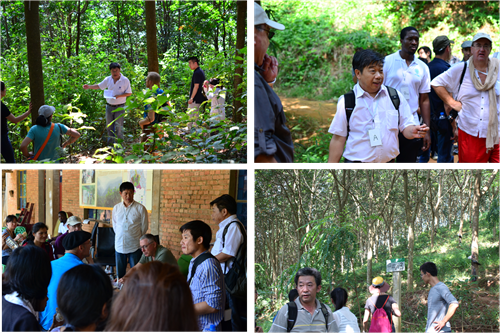Xishuangbanna, CHINA, 17 October 2016 - Researchers, experts and local people from across the globe met today to attend the four-day Sustainable Rubber Conference, which aims to explore ways in which rubber growers can secure stable incomes while at the same time protecting the environment and local livelihoods.
Rubber plays an important part in the economies of many Asian countries, but the rapid expansion of rubber cultivation in recent years has brought serious problems: tropical rainforests have been cut down and converted to monoculture plantations, local communities have lost access to their land and resources, and the high prices hoped for by farmers have disappeared.
"Rubber growing ought to provide sustainable incomes without destroying the environment or causing social problems" said Professor Xu Jianchu, Principal Scientist of the World Agroforestry Centre, one of the conference organisers. "To make sure this happens, we need to bring together all the key players in the industry, from government agencies to researchers to growers and buyers, and design solutions together" said Mr. Lihui Sun, project coordinator for developing the Investment Guidelines for Sustainable Development of Nature Rubber from the China Chamber of Commerce of Metals Minerals & Chemicals Importers & Exporters (CCCMC).
However, the challenges facing the industry require concerted action. According to Dr. Rhett Harrison, tropical forest ecologist at the World Agroforestry Centre, "in order to address environmental and social concerns, tools such as appropriate land use planning and rubber agroforestry systems need to be far more widely adopted by the rubber industry."
"Smallholders today account for more than two thirds of rubber plantations in Asia", said Prof. Jin Chen, Director of Xishuangbanna Tropical Botanic Garden. "With the right policies in place, local governments can help these farmers to grow rubber in an environmentally and socially responsible way."
The conference will hear from a range of experts on subjects such as the ecology of rubber plantations, rubber agroforestry, modelling of climate change impacts, and the socio-economics of rubber cultivation. The conference, to be held at the Xishuangbanna Tropical Botanical Gardens in the southwestern Chinese province of Yunnan, will also draw up a series of guidelines aimed at helping the rubber industry meet environmental, social and economic goals.
The conference is an initiative of the Sustainable Rubber Platform, which was established as a means of promoting the development of socially responsible and environmentally friendly practices across the industry.
The World Agroforestry Centre (ICRAF) is a research organization that focuses on integrating trees into agricultural systems in ways that benefit the poor and the environment.
The Sustainable Rubber Conference runs from 16 to 19 October 2016 at the Xishuangbanna Tropical Botanical Gardens, Yunnan, China.

Field tour to environment-friendly rubber plantations
URL: https://www.eurekalert.org/pub_releases/2016-10/wac-src101416.php
http://scienmag.com/sustainable-rubber-conference/

